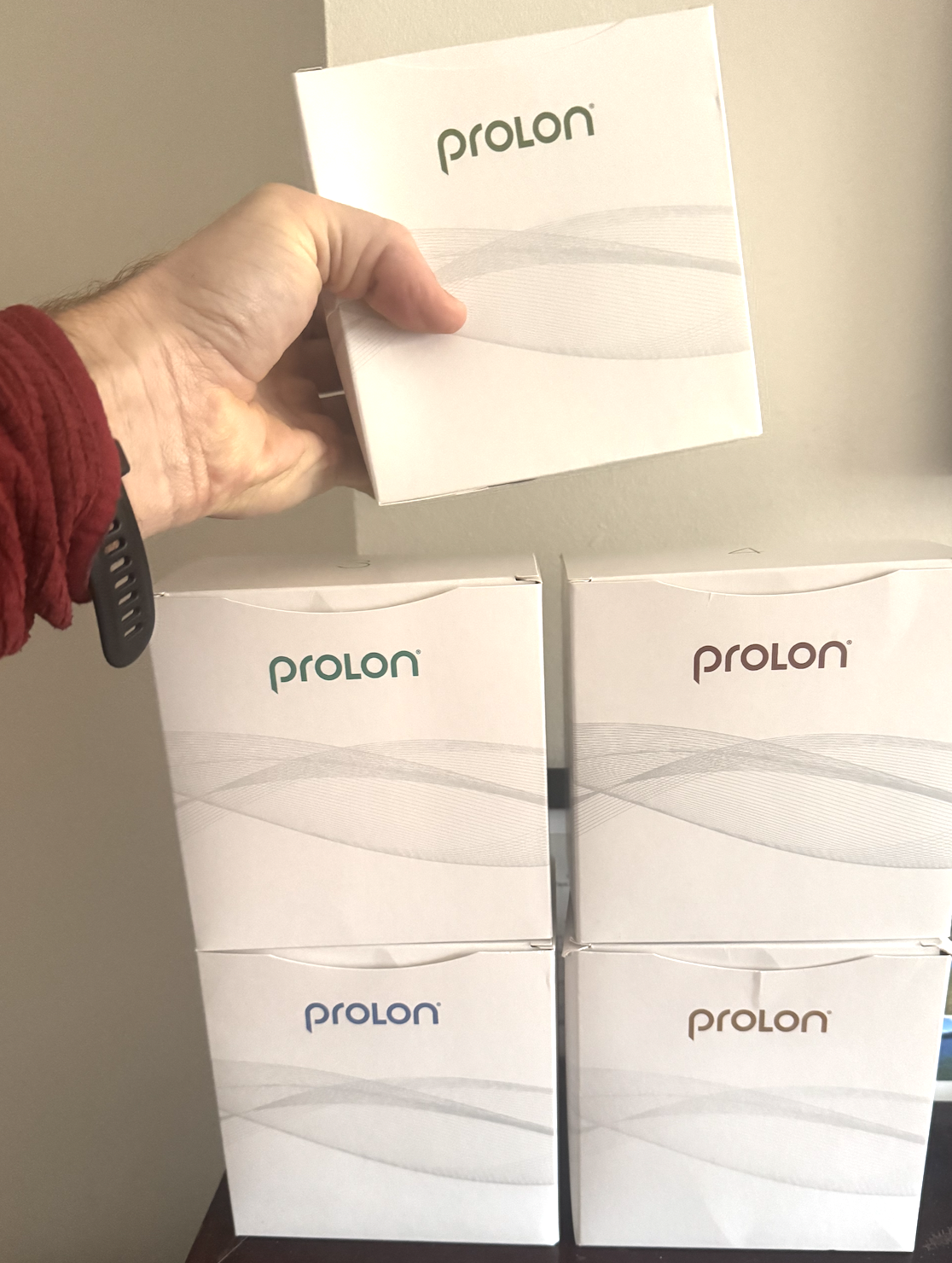ProLon Fasting Mimicking Diet (FMD)
Experiment: Fasting Mimicking Diet
About three years ago I read Longo’s Longevity Diet, and it helped me form a foundation about nutrition. Ever since reading it I have been wishing to do a FMD, but training, travel, or life always got in the way. I decided it might be a good match to try and eat slightly in surplus, and then do the fast once I hit the goal weight.
Exactly as per the plan I added about 2.5kg by the end of June, so decided to go ahead with the fast. Coincidentally ProLon, the company that helps make FMD kits, had a 30% sale, so I got my kit and chose the week to give it a go.
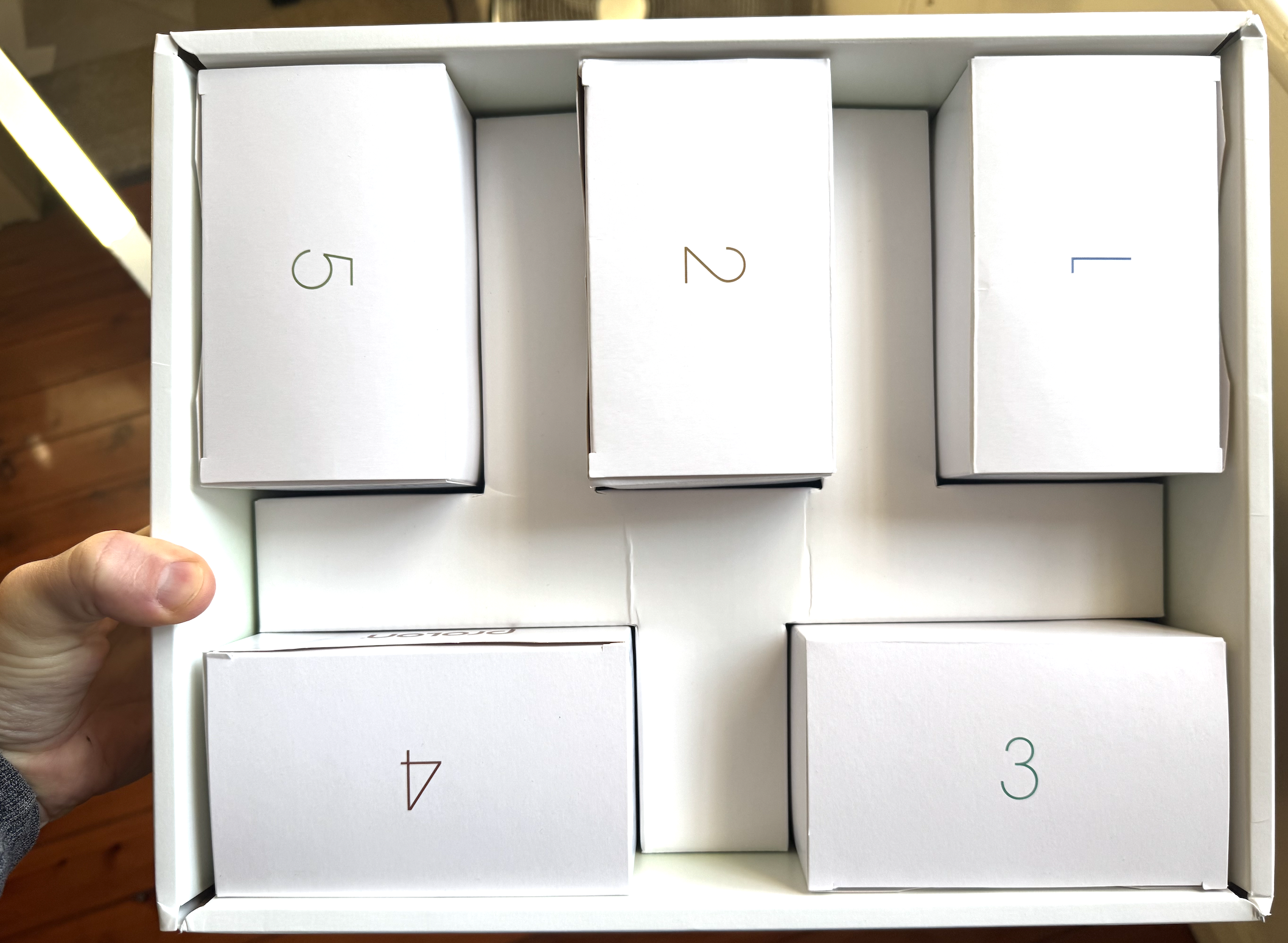
I did a 14 day fast when I was a teenager based on a dare, so somewhat knew what to expect: the first few days aren’t great, but then your body adapts and things are easier. I also knew that after the fast appetite would be suppressed for a few days. Unlike when I did the dare as a teenage this fast was actually backed by evidence:
https://www.science.org/doi/full/10.1126/scitranslmed.aai8700
The fasting-like diet reduced body weight and body fat, lowered blood pressure, and decreased the hormone IGF-1, which has been implicated in aging and disease. A post hoc analysis replicated these results and also showed that fasting decreased BMI, glucose, triglycerides, cholesterol, and C-reactive protein (a marker for inflammation).
https://www.nature.com/articles/s41467-024-45260-9
Based on a validated measure of biological age predictive of morbidity and mortality, 3 FMD cycles were associated with a decrease of 2.5 years in median biological age, independent of weight loss
Journal
Day 1
I skipped breakfast, already knowing I would prefer to bunch my calories and lunch and dinner, and waited until about 11:00am to open the box. Everything is laid out nicely, and it is pretty clear what to do. If you’ve ever made soup before, then you can do this!
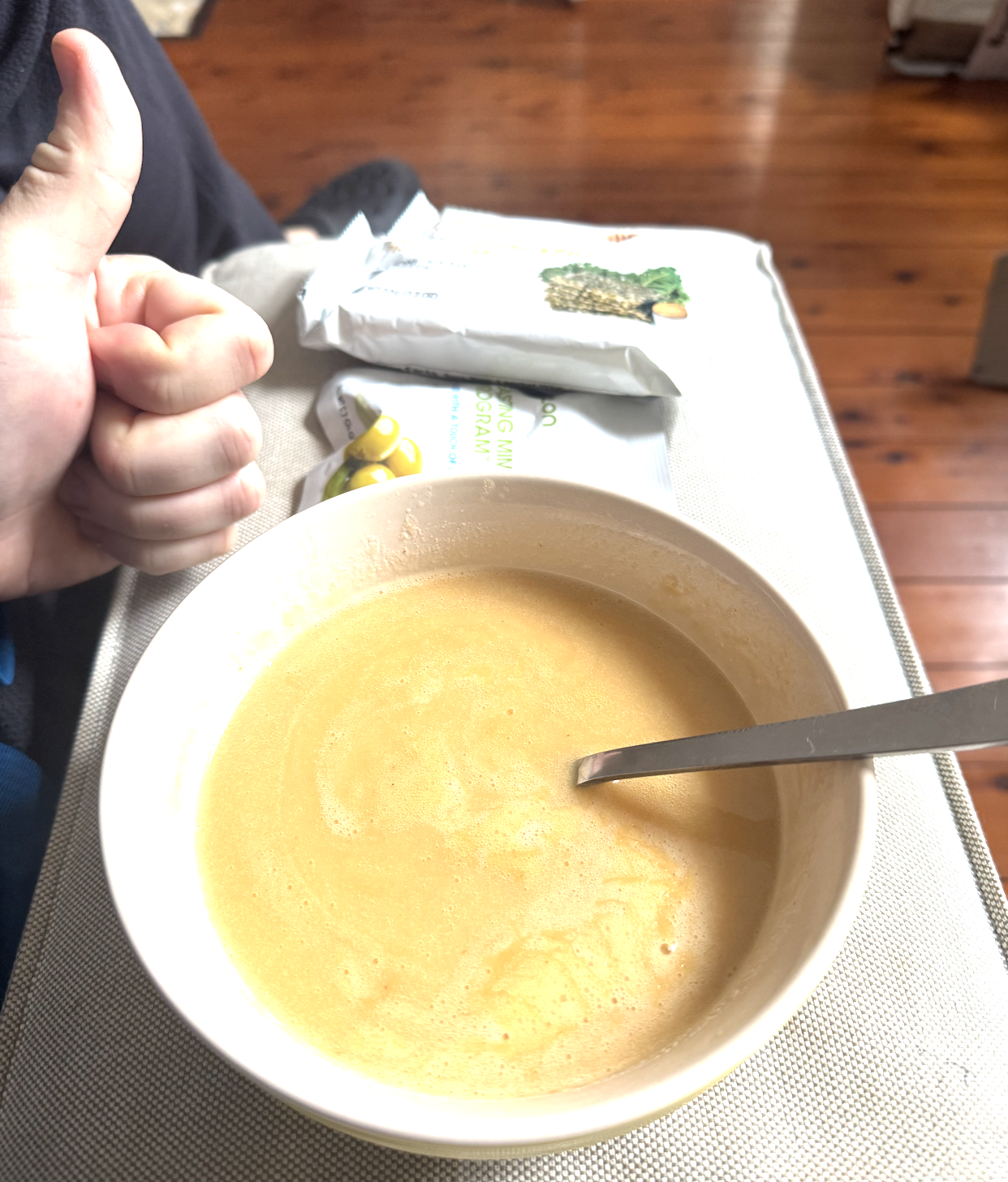
Feeling for the day was pretty good. I was in a calorie deficit from both days over the weekend, due to being quite active, which I think helped ease me in to a real fast. It helps being at least a little fat adapted, so you might want to ease back on the carbs the week prior and instead swap in more fat.

Day 2
Slept amazing the night before; according to Garmin it was the best sleep I’ve ever had; they even gave me the “mythical sleep” badge! I don’t know if I would say it is the best sleep I’ve ever had, but it was very very good. Mildly hungry. Went to the gym and did a light leg day, burning about 200 calories while working out.

Day 3
I knew this would be the hardest day, and I think I was right. Slept average the night before, and feeling more fatigued. Brain fog has kicked in. In retrospect I even made one small mistake at work, which (I don’t think) tends to happen that frequently.

Day 4
Slept better the night before, and hunger levels have decreased. It is a weird feeling knowing you’re hungry, but not really feeling hungry. Brain fog has gone away.

Day 5
Felt like I slept OK, and long, but back got a little sore and it woke me up a few times. My body probably isn’t used to this little activity and sitting around. Mind feels crystal clear.

Day 6
Slept OK. Wasn’t hungry when I woke up, but excited to be able to start training again! The transition day seems to be aimed at getting one’s body ready for whole foods again, and trying to get people to eat healthy. My regular diet is pretty good, so I am opting to skip the soups and generally resume eating as normal. I had a giant salad for breakfast.
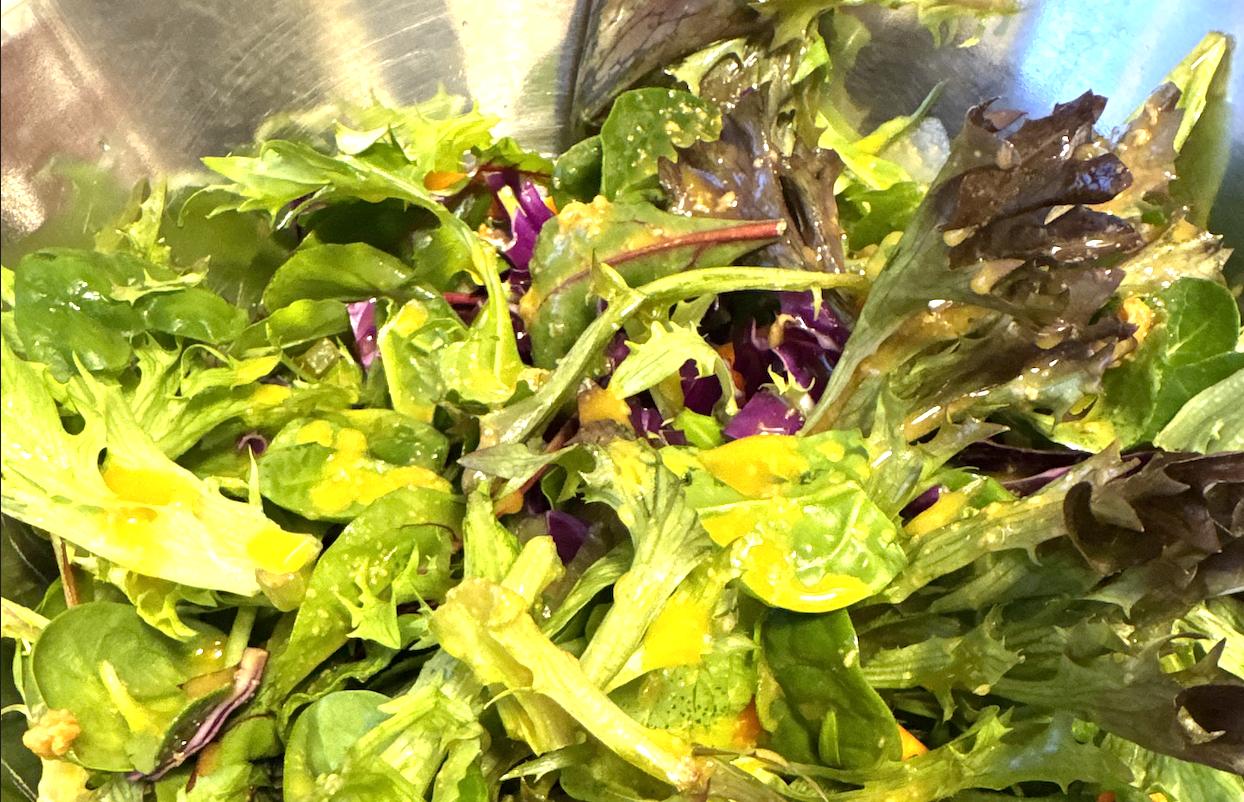
We can see the dramatic drop in calories by this chart (from 21-July-2025):
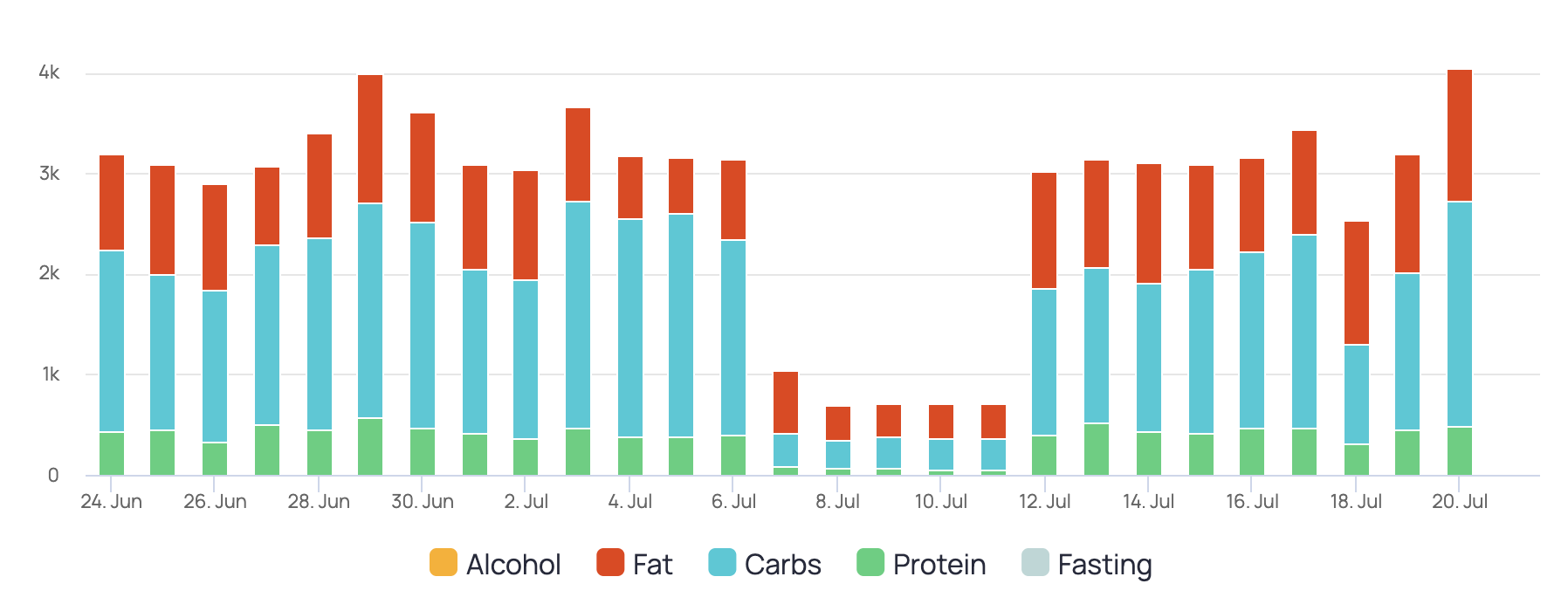
Reflections
I had the privilege to be able to use a glucose/ketone meter to track my progress, and wish I had recorded it on the first morning so I could see it rise. It looks like I was in ketosis on every measurement. You can see how I did in this chart:
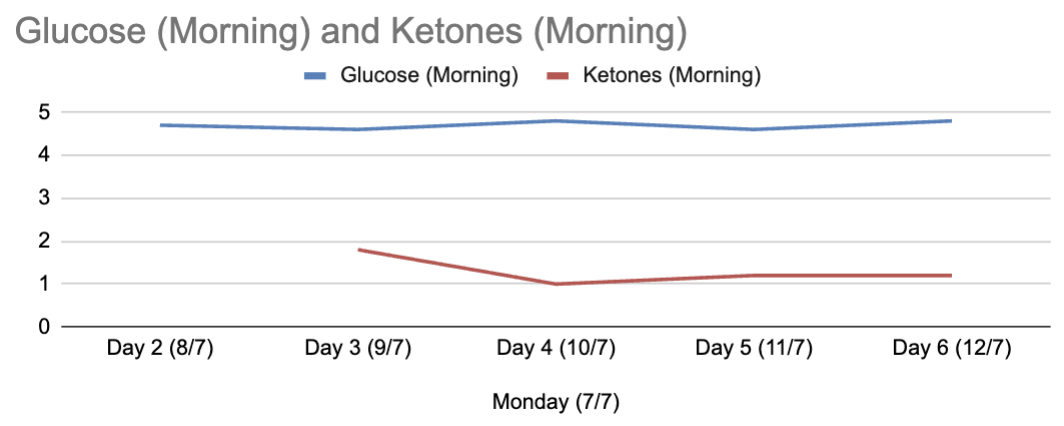
Overall the fast went well, and I don’t think I burned any bridges by being too grumpy! I stopped running during the five days, but I tried to do some strength training to prevent muscle loss.
Did it work? What does work even mean? Can I even measure autophagy?
I don’t know the answers, but in two weeks I’ll get my blood checked to see if my biomarkers improved.
My weight did decrease, which you can see in this chart (my goal was to get to 80kg before starting the fast), but then quickly rebounded, I presume from resuming creatine consumption and getting water in my muscles again.

Day 2’s morning weight measurement was 77.1, and Day 6’s morning measurement was 75. I suspect that when I weight myself tonight it will be around 76 - 76.5.
Tips
Are you thinking of doing the FMD? Here are some tips:
- If using ProLon, add water to your soup as per the instructions, and use a whisk to mix it. Then let it sit for at least 15 minutes, and use a whisk again. This makes sure it is totally mixed.
- Give yourself permission to take it easy. I stopped running entirely, not because I couldn’t, but because I don’t want to burn those calories. If I had excess weight to lose then I would consider exercising.
- Consider having most of the calories around dinner time, as this will prevent you from feeling too hungry when you fall asleep, which for me is a feeling I don’t love.
- It is possible to DIY FMD, which I’d consider doing next time. I actually think that might be an easier way to have food with more volume, which might help with satiety.
- Stop drinking water/tea relatively early. For some reason even though I stopped around 7pm on Day 2, I ended up needing to pee in the middle of the night twice.
- Make sure you’ve got the right mindset going in to this thing. Be fully bought in to why you’re doing this, and remind yourself that the discomfort is an opportunity to teach yourself more resilience. Embrace the suck.
- Stop drinking liquids really early - even earlier than you normally would. I was stopping 3hr before bed, as I normally would, and I still had to pee almost every night, I think, which is pretty unusual. One night I had to pee twice.
- It is only five days. Take a photo of your accomplishment! You got this.
